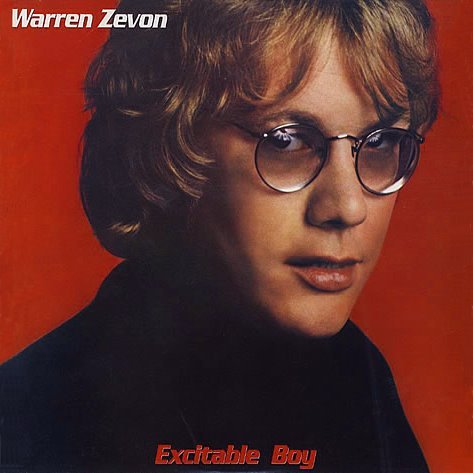For reasons that now seem ridiculous, I wrote off Warren Zevon for a long time. Like They Might Be Giants — who I’ve also wised up about — I assumed for years that Zevon, despite his long career, was a wacky classic rock one-off: in his case, a guy who wrote a dumb song about a werewolf. I’m glad I came around.
I don’t remember why I suddenly became curious about his back catalog, but a few years ago I picked up his best-of, Genius, and became a convert. Not every song on Genius is great, but some are downright amazing, from the acoustic jam “I Was In The House When The House Burned Down” to classics like “Poor, Poor Pitiful Me.” The guy was ridiculously talented, but you know that already, right? Everyone seems to have known this for years, and I feel like an ass for not listening sooner.
I recently bought a vinyl copy of Excitable Boy for 99¢. The album works best on record, especially a used copy with pops and hisses, because as timeless as Zevon’s songs are, Excitable Boy is very much a product of the 1970s. Specifically, the album is late-70s California, dripping with post-hippie, post-Watergate cynicism. It’s disturbing, hilarious, and heartbreaking. In short, it is quintessential Warren Zevon.
The first side of Excitable Boy is basically unimpeachable, with titles as versatile and acerbic as Zevon himself: “Johnny Strikes Up The Band,” “Roland The Headless Thompson Gunner,” “Excitable Boy,” “Werewolves Of London,” “Accidentally Like A Martyr.” The first indication of the album’s genius lies in the story of Roland, a ridiculous plotline which Zevon tells with utter seriousness. Upon finding the man who blew off his head, Roland “aimed his Thompson gun, he didn’t say a word.” Because he, you know, doesn’t have a head.
That tone sticks around for most of Side 1, including the one-two punch of the title track (which I’d heard often on classic rock radio but never listened to closely for its lyrics about rape and murder) and the silly “Werewolves of London.” The latter is, of course, Zevon’s most famous song, but it’s more subtle than it appears — I don’t often laugh out loud when listening to music, but every time I hear Zevon intone “and his hair was perfect” followed by a bizarre, unwritable outburst (maybe it’s “bip”?), I can’t contain myself.
That Zevon follows “Werewolves Of London” with the heartbreaking ballad “Accidentally Like A Martyr” is an example of his extreme, and earned, confidence. The song is one of his best, from its Randy Newman-esque piano phrases to its understated lyrics, not to mention background vocals from Zevon cohort Jackson Browne (who co-produced the record). It’s a beguiling mix, proving that Zevon could use irony for more than humor.
The rest of Excitable Boy is more hit-and-miss than its stellar first side: “Night Time in the Switching Yard,” with its funk-meets-disco stomp, is the only true dud of the collection; and “Veracruz,” a character take on the Zapatas, is simply dull. But from there you get to the solid ballad “Tenderness On The Block” and the masterful “Lawyers, Guns, and Money,” which, in only a three and a half minutes, tells a funny story about espionage, poor choices, and spoiled rich kids.
The fact that I’ve rattled off Excitable Boy’s highlights without saying much about the musicianship is a testament to the record’s excellence. Almost all the songs feature only a guitar, bass, drums, and piano, which lends the collection a sense of intimacy. The band is astoundingly tight, and so are bassist John McVie and drummer Mick Fleetwood, on loan from Fleetwood Mac, who provide the rhythm section for “Werewolves Of London.”
If you’re looking for an entry to Warren Zevon’s canon, Excitable Boy is the perfect place to start — a solid representation of his songwriting and musicianship that also hints at the many peaks to come.
